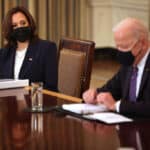The world’s next refugee crisis is here, which means actions taken by the United States and Western countries in the immediate future can determine the future of our national security. “Unless the U.S. and its partners sufficiently respond to this next big refugee crisis, millions of displaced Afghans in 2021 could make the 2015 migration crisis seem like a geopolitical walk in the park” reports Defense One.
In 2015, at its peak “migration crisis” levels, over 1 million people from Syria, Afghanistan, Nigeria, and elsewhere flocked to Europe, causing geopolitical disruptions. Afghans have already made up the third-largest group of refugees, with 2.6 million people by the end of 2020. Include the “estimated 3 million internally displaced people living across the country, almost 6 million Afghans have been forced to leave their homes in recent years even before the Taliban takeover” according to Defense One.
With over 40 million people still in Afghanistan “contemplating escape, especially women and children” Defense One states, “it would not be surprising if the number of forcibly displaced Afghans – including refugees – doubles over the next couple of years.”
The Defense One report adds:
This should concern U.S. national security policymakers. Beyond their increasingly obvious humanitarian needs, displaced Afghans find themselves between a Taliban-sized rock and a closed border-shaped hard place. Pakistan and Turkey have refused them. China does not want them. Iran will keep them in camps. For desperate people, desperate measures will necessarily include escape through perilous terrain smuggled by dangerous groups – smugglers, traffickers, and other organized criminal networks – which see movement of vulnerable people as new opportunities for business, all part of a $6.75 billion global human smuggling industry.
Europe is still struggling from the 2015 immigration crisis, including cultural clashes, reallocating limited resources, language barriers, and even terrorists and “bad actors” sneaking across borders under the refugee guise. Due to the Taliban’s new control over border crossings and commercial flights halted out of the country, “must of the forced displacement is likely to be internal, at least at first.”
While neighboring countries generally “bear the brunt of refugee hosting duties during forced displacement crises” Turkey, Pakistan and Iran “have already banded together to try to stop more Afghans from coming” according to the report.
Additionally, the Taliban took over during a global pandemic, “when the number of forcibly displaced people worldwide (over 82 million) is at an all-time high and the willingness of rich countries to resettle them is at an all-time low.”










